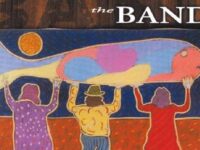We were reminded again on Ramble at the Ryman, a record both timeless and new, that the late Levon Helm was the loamy voiced, rail-jumping rhythmic center point of the Band, the yearning storyteller and gritty soul. The Band’s records were drawn from continuity, bringing in dizzyingly diverse, age-old influences and performed in a chorus as if by brothers. That has always made a treasure hunt out of selecting any individual triumph.
Not here. Recorded in the period just after Levon Helm’s acclaimed 2007 return following a health scare, this stirring live document — released on May 17, 2011 — was both a showcase and an important reminder: The Band’s principal songwriting credits may have gone to guitarist Robbie Robertson, but they were then — and were here again on Ramble at the Ryman — often completely inhabited by Levon’s carnal Arkansas drawl. Even after an initial bout with throat cancer, his singing remained a wonder of ribald bewilderment, old-time religion and chaotic promise.
This wasn’t, of course, Helm’s valedictory for the Band. Also included inside Ramble at the Ryman are trio of tracks from the then-new Grammy-winning effort for best traditional folk album Dirt Farmer, among them “Wide River to Cross,” “Anna Lee” and “A Train Robbery.”
Appearing with a raucous group fronted by multi-instrumentalist Larry Campbell (Bob Dylan, Lyle Lovett, Solomon Burke), Levon Helm also stirred in songs that matched both in tone and texture — songs that helped form the foundation of the Band’s later triumphs. There’s “Back To Memphis,” the title track of a 1967 Chuck Berry release; “Fannie May,” the No. 1 1960 R&B hit for Buster Brown; “Baby Scratch My Back,” a No. 1 R&B hit for Slim Harpo in ’67; the Carter Family’s classic “No Depression in Heaven”; “Deep Elem Blues,” a 1920s-era traditional song later covered by Jerry Lee Lewis and the Grateful Dead; and Lefty Frizzell’s “Time Out for the Blues.”
Still, the highlights of the recording remained Levon Helm’s rollicking new takes on signature tunes from his tenure in the Band with Rick Danko, Richard Manuel, Garth Hudson and, early on, with Robbie Robertson. He opened this show with an almost anarchic “Ophelia,” originally from 1975’s Northern Lights-Southern Cross and now a shambling, horn-driven hoot.
Helm’s update of “Evangeline,” memorably performed with Emmylou Harris on the Band’s 1978 release The Last Waltz, includes a new guest turn by Sheryl Crow — who joins in a high lonesome vocal accompaniment with Helm. “Rag Mama Rag,” plucked from 1969’s The Band and always a great showcase for Levon Helm’s deep South honk, has slowed by a half step, sounding slinkier and in no small way more dangerous.
Ramble at the Ryman also featured two songs closely associated with Helm’s former Bandmates, beginning with keyboardist Brian Mitchell filling in at the mic during 1970’s “The Shape I’m In” for the late Richard Manuel. Later, on “Chest Fever,” from the Band’s debut recording, Garth Hudson’s iconic “Genetic Method” organ intro is smartly reimagined as a Larry Campbell guitar lick. (I’m not sure anyone could have approximated the heady mixture of soul and dementia that Garth always brought to this track at the keyboards, anyway.)
Finally, there was the 1968 Band classic “The Weight,” featuring one of Levon Helm’s most memorable shared vocals, this time with John Haitt taking over Rick Danko’s aching asides. The rollicking arrangement, gospel-inflected and brassy, brilliantly echoed Allen Toussaint’s charts for the Band’s Live at the Academy of Music recording.
By the end of Ramble at the Ryman, there was little question of Levon Helm’s importance, within that group — but also within the broader landscape of American roots music — as inventive interpreter, as country proselytizer. His sermon, shouted before a jubilant crowd in Nashville that night: As long as these songs have been around, from his former group and from much further back, they will always provide us with a lasting communal joy.
You get the sense that our time with them — despite Levon’s later passing, despite these song’s advancing age — is even now just beginning.
- How Deep Cuts on ‘Music From Big Pink’ Underscore the Band’s Triumph - July 31, 2023
- How ‘Islands’ Signaled the Sad End of the Band’s Five-Man Edition - March 15, 2022
- The Band’s ‘Christmas Must Be Tonight’ Remains an Unjustly Overlooked Holiday Classic - December 25, 2016




